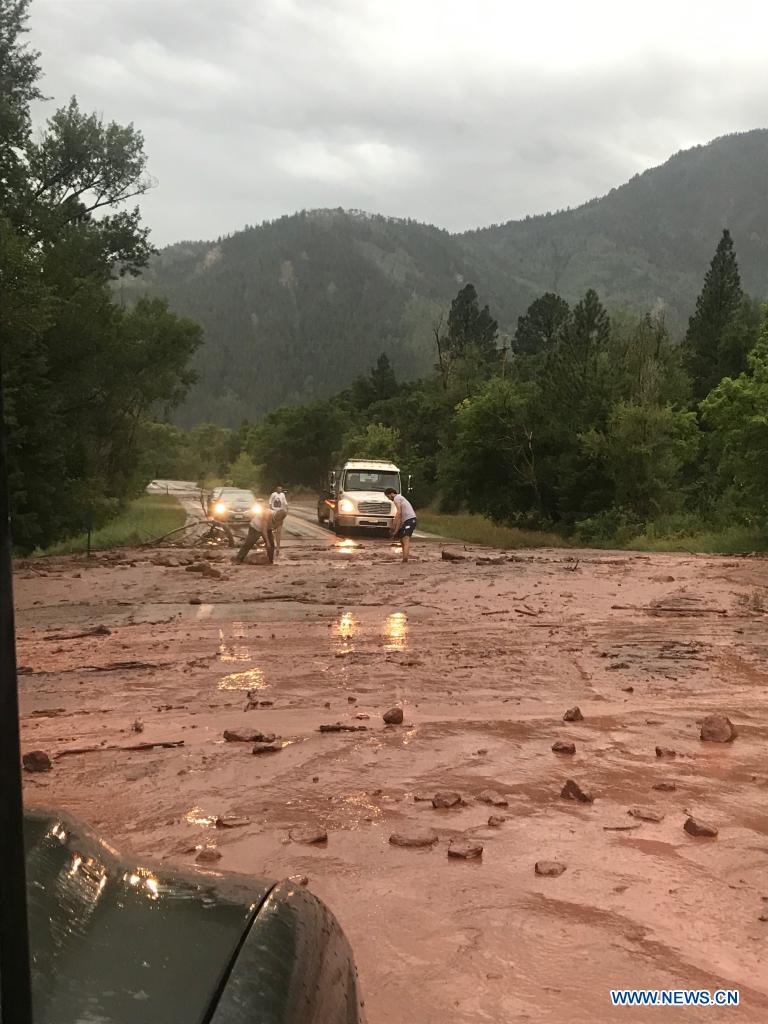
CO Hwy 133 is seen covered with mud after mudslides in Rocky Mountains, Colorado, the United States, on July 30, 2021. Shortly after 9:00 p.m. local time Thursday, Interstate 70, the major transportation artery between east and west America, was frozen by an avalanche of rock, mud, and burn debris and the authority predicted it could not be reopened this weekend. (Photo by Peter Mertz/Xinhua)
by Peter Mertz
DENVER, the United States, July 31 (Xinhua) -- Shortly after 9:00 p.m. local time Thursday, Interstate 70, the major transportation artery between east and west America, was frozen by an avalanche of rock, mud, and burn debris and the authority predicted it could not be reopened this weekend.
Interstate 70, or I-70, a famous American highway, which stretches 2,171 miles (3,493 km) from Baltimore, Maryland into Utah, is the only mode of travel through Colorado's Rocky Mountains.
"We moved quickly and did everything we could do," Tamara Rollison told Xinhua Friday, of a concerted, drama-filled effort by Colorado Department of Transportation (CDOT) officials to save lives in narrow Glenwood Canyon, long considered I-70's biggest bottleneck -- in the heart of the Rocky Mountains.
"Within a few minutes," the landscape in the scenic canyon changed dramatically as mud and rocks flowed down steep hillsides and onto the four-lane interstate, where dozens of cars and trucks were unsuspectingly heading west into the mountains.
In the middle of isolated, 12.5-mile-long Glenwood Canyon, "while debris was flowing onto the roadway," and as the skies unleashed monsoon rains, CDOT staff pounded on windows of stopped cars, just before debris swept onto the highway, and ushered 29 motorists trapped in their vehicles into the safety of their remote facility.
The harrowing sequence of events that quickly unfolded Thursday night was documented Friday on CDOT's website and had fire and rescue crews scrambling through the night in hail and sheets of rain to save those stranded.
Between Thursday night and Friday morning, rescue crews and CDOT personnel evacuated 108 stranded individuals from Glenwood Canyon, including the 29 who spent the night in CDOT's Hanging Lake complex, a facility located above a mile-long tunnel, below where the 32,000-acre (129.5 square km) Grizzly Creek fire in 2020 created scarring and mudslide conditions.
CDOT officials told Xinhua Saturday they were thankful no one was injured or killed and grateful for the National Weather Service (NWS) for sounding the alarm long before the deluge struck, that was triggered by water runoff on barren slopes created by the Grizzly Creek fire.
A Flash Flood Warning remained in effect through Saturday across a large swath of northwest and north-central Colorado as a slow-moving storm system lingered over the Rockies.
State transportation officials were shaking their heads Saturday, calling the widespread mudslides in the mountains "unprecedented" and unexpected.
Highway crews will be working overtime in Glenwood Canyon this weekend to reopen I-70 from several debris flows measuring 1 to 1.5 meters thick and more than 15 meters wide in several places, CDOT reported.
While I-70 was closed for the third time in one week, so was CO Hwy 133 in the high rockies, between Carbondale and Marble, that saw its worst flooding Friday night.
"I can't get home and I live right over there," said Susan Spaulding, pointing across a mudslide at her home less than two km away.
One CDOT road crew told Xinhua Saturday he had worked 30 straight days without a break, and the department was desperate to find staff to assist in areas where mudslides and floods had hit the Rockies.
Called one of the "most extraordinary highway projects ever constructed in the United States," the Glenwood Canyon section of I-70 opened to traffic on Oct. 14, 1992 -- a stretch of highway built on bridges elevated above the Colorado River, wending its way through and around the canyon's sheer cliffs that tower 1,300 feet (396.2 meters) above.
An 80-km-long stretch of I-70 between Rifle and Dotsero remained closed Saturday, hampering business and transportation for locals along the highway corridor.
With the Glenwood Canyon section of I-70 closed, a normal 2.5-hour car ride from Glenwood Springs to Denver will now take around seven hours on detours through the mountains, CDOT noted. Enditem